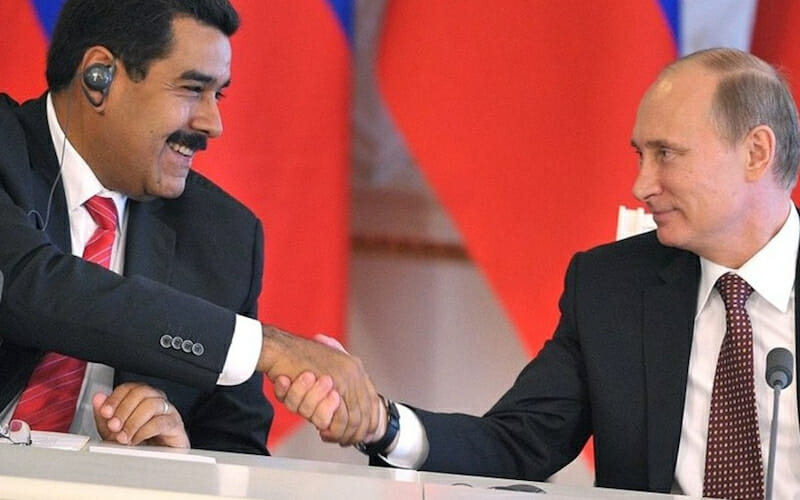
Growing Russian Interference in Latin America
When the world thinks of Russian foreign intervention, the natural first thought is Russia’s near abroad, such as Georgia, Moldova, and Ukraine, where Russian interference fuels frozen conflicts and impedes the sovereignty of these countries. However, Russia’s reach expands far beyond the former Soviet republics and much closer to the United States than commonly discussed – in Latin America.
For instance, Russian influence in Cuba dates back to the Cold War. After the failed U.S. Bay of Pigs invasion, Khrushchev instigated a general Soviet arms build-up in Cuba and created a secret agreement with Cuban leader Fidel Castro to locate Soviet nuclear missiles in Cuba to deter any future U.S. invasion attempt, inducing the Cuban Missile Crisis.
Fast forward to today, and Russia is again expanding influence in Cuba, especially in light of President Trump’s hardline stance toward the island nation. The Russian company Interrao has built four power generation facilities on the island, the car manufacturer Avtovaz and other Russian companies are increasing sales to Cuba, and Russian state oil company Rosneft resumed fuel shipments to Cuba and is negotiating a major energy agreement. Moreover, Russia has discussed building a railway in Cuba and modernizing the Cienfuegos oil refinery. In October of 2017, the governments signed an agreement continuing Russian oil donations and expanding other petroleum sector cooperation.
In Nicaragua, Russia has supplied the country’s military with a variety of equipment, including BMP-3 and BTR-80 armored vehicles, Mirazh patrol craft, Molina missile boats, and T-72 tanks to replace their aging T-55 antecedents. Also, reinforcing an established relationship with Nicaraguan president, Daniel Ortega, whom took over the country in 1979 with the assistance of the former Soviet Union, Russia instituted a counterdrug center in Las Colinas last year. The center was initially intended to train Nicaraguan police, but it is expected to eventually host Central American personnel in order to bolster Russian security engagement with the whole region. Further, Russia constructed a facility near the U.S. embassy outside of Managua with the purpose of communicating with its GLONASS satellite constellation, but some have suggested that the equipment could be employed for espionage.
In the midst of a domestic crisis, international disapproval, and U.S. sanctions, Venezuela has turned to Russia as one of the government’s only international supporters for financial and political support. Both Russia and Rosneft, Russia’s state-run oil company, are major Venezuela financial proponents, purchasing sovereign debt, advancing cash to Venezuela’s national oil company, PDVSA, investing in oil and gas fields, and even restructuring a Venezuelan debt of $3.1 billion at the beginning of this year. In addition, Rosneft negotiated the right to develop two offshore gas fields at the end of last year, and just recently, a small Russian bank become the first international financial institution willing to support “el petro,” Venezuela’s digital currency created in order to dodge U.S. sanctions.
When considering Russia’s growing role in Latin America, it is important to acknowledge Russia’s historic aggression toward the United States and widespread tolerance of human rights violations. Specifically, if we look to the regions where Russia is already heavily involved, we observe a grim example of what Russia supports and what we can potentially expect to see in Latin America. In Ukraine, for example, following the outbreak of civil war provoked by Russian annexation of Crimea, the United Nations Human Rights report recorded nearly 10,000 deaths of both Ukrainian military members and civilians between 2014 and 2016. Moreover, in Syria, Putin upholds support for Bashar al-Assad’s murderous regime, recognized for its use of chemical weapons on its citizens, war crimes, and silencing of political opposition.
These egregious domestic situations in Ukraine and Syria demonstrate that Russia’s values and aggressive foreign policy is adverse to U.S. interests and security. With this context in mind, international security and foreign policy experts are continually analyzing Russian intentions. According to Angela Stent, “Russia has vowed to replace what it sees as a coercive U.S.-led global order with one in which the West respects Russia’s interests…but the United States and its allies have repeatedly underestimated Russia’s determination to revise the global order that Moscow feels the West has imposed on Russia since the fall of the Soviet Union.”
It is no coincidence that Russia is increasing its engagement in the backyard of the United States, as a method to further expand global influence and gain proximity to the U.S. Given recent Russian disinformation campaigns in the 2016 election, Russia is eager to generate chaos and unrest in the U.S., just as it does in its other foreign ventures. It is clear that the North American people and the security community need to shift more attention to Russia’s activities and intentions in the Western Hemisphere.

